The first flour mill in the Central Okanagan: excerpts from the Oblates of Mary Immaculate (OMI) letters concerning the flour mill built on Mission Creek.1
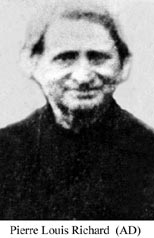
Father Pierre Richard,2 OMI, accompanied by Father Charles John Felix Adolf Pandosy,3 OMI, arrived in the Okanagan in the autumn of 1859 and together they established the Oblate mission on the banks of Mission Creek.
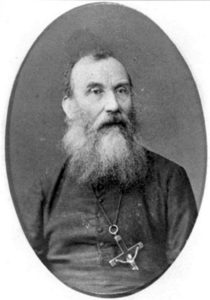
Pandosy was transferred after two years, being replaced by Father Paul Durieu,4 OMI, who spent three years in the Okanagan. Richard remained in charge until 1868 and was kept very busy in the first few years constructing the mission buildings, a schoolhouse and a flourmill. Richard was absent for months at a time as he served an extensive area, as far north as the North Thompson River. The first reference to the flour mill is found six years into his term.
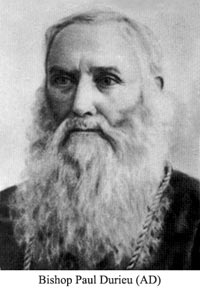
Richard to Bishop d’Herbomez,5 14 November 1865
…Regarding the mill, I don’t know what to say. Although we can lead the water of the river very near to the house to operate the mill, it is not an easy thing to do. The health of the Brother has not been good and it is necessary to employ strangers to construct the water wheel and other … [indistinct]. [We have employed] a good worker and compensate him well, but we have not budgeted for that and cannot pay….
Father Francois Jayol6, OMI, arrived in the Okanagan Mission on 4 October 1864 and he remained until the end of December 1866. It is clear from his first letter that he had been left with responsibility for constructing the mill.
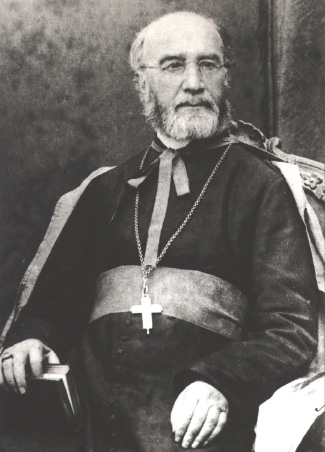
Jayol to d’Herbomez, 10 December 1865
We have not been able to equip the mill that you have sent us for several reasons. I am frustrated. I regard the mill here as a calamity and the absolute [bane?) of our house. In effect, our house, our mission will be opened to all the strangers and our table will become public. It will be necessary to replace the wheat that people bring with flour, put the horses of Pierre and Jacque in our pasture, furnish a bag to these here and to those who remain here en route, people are deceived, one takes the wheat of another etc., etc. and after all this pain and all the turmoil, we will be accused of trading errors, of stealing, etc. One other thing, when people come to grind it is necessary that the Brother be there to conduct the horses and do the grinding, and most of the time he will be able, only with difficulty, to extract himself from the mill and moreover, how does the Brother learn to become a miller? What good lessons of [indistinct] and of morale are not received here. The more the thing is examined the more it is seen to be inconvenient and without advantage and I am opposed to it. I assure you that, for my part, I will be content to cook the wheat if, in order to eat bread, it is necessary to have a mill here. Permit me, Monseigneur, to postpone the erection of the mill until the time of the visit of Your Grace, when you can see with your own eyes all of the reasons and our position; decide then if it is necessary to do so.
It seems that Jayol’s plea to his Bishop was in vain because a few months later the mill was under construction. Father Florimond Gendre7 arrived at Okanagan Mission before Father Jayol left and he stayed at Okanagan Mission until his death from tuberculosis in 1873.
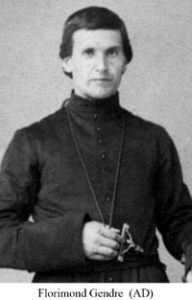
Gendre to d’Herbomez Fall, 1866
The Mill! The mill! There is a headache of a business. From last August to October 11, 42 days at $1 a day for food = $42. Then 36 days of work at $3 per day = $108, plus $42 = $150. Already it is $150 for the mill and how many more days it will be, I do not know. We are trembling lest it doesn’t work despite so much trouble. I assure you that the worker is not wasting his time and that he works conscientiously. He is a fine, skilled, honest man, etc. and likely one cannot find anyone better on all counts. The wheel of the mill took almost a month. It is to be regretted that if the good Father Jayol had not given the contract by the hour it would have been finished some days ago. The Father believed that such a thing was not possible but he was mistaken. The Brothers are doing much of the work and the tradesman only does the work that the Brothers cannot manage at all. How it will please me to see this work finished and the mill making us a little flour because we have almost none left of that brought from Fort Hope. The residents and the miners are also in a state of impatience to come to grind their wheat. They will be very disappointed if the mill works for several days without them having the opportunity to grind their flour. The good Father Richard leaves us with a heavy burden on our shoulders. I don’t know how I am going to pay this worker should he demand all his wages in money. I think that the sum will be at least $130. I ask you, Monseigneur, to send us permission to let the whites grind and to charge them $1/2 for a Minot.8 I think $1/2 is a reasonable price – everyone would be able to grind his wheat at that price. 200 Minots could be quickly ground to pay our worker. That is a lot written about this dear mill. May the Good Lord deliver us from our cares on this subject. All the whites and miners are waiting to grind. What a terrible state of affairs if you do not let them use our mill.
Gendre to d’Herbomez 24 October 1866
…I am sending this letter via Mr. Brown, the man who set up our mill. We have not been able to try this evening to see if it can give us some good flour. Tomorrow all will be seen and finished by tomorrow evening or he will be denied all of the payment.
Gendre to d’Herbomez 25 October 1866
The mill is still not finished. It causes new headaches. We will be charging $.50 per bushel to someone who wants to grind. Those who find this too dear can go elsewhere….
Unsigned but undoubtedly Gendre to d’Herbomez 28 October 1866
Regarding money owed to Mr. Brown for work performed on setting up the mill. 50 days at $3 per day…. A number of Indians will be here by Christmas in the course of which we want to have the mill going. It seems to go poorly. I am sending you a specimen of flour. Brown and LeDoux want to leave immediately. You have the [indistinct] to pay the $100 to Mr. Brown. If the mill goes well I will be able to reimburse you quickly. Excuse me Monseigneur…. Something is wrong with the mill. I gave $50 to Mr. Brown last August. From 29 October to 7 December 50 days work $150.
Gendre to d’Herbomez 1867
Our mill goes worse and worse. We fear that it will not [last long?]
Gendre to D’Herbomez, 19 June 1867
…Our mill is always about the same, or rather going rapidly enough towards its ruin.
Gendre to d’Herbomez 7 September 1868
…Suppose that our mill is working well, tell us how we should deal with the whites who want to grind. We think that it is impossible to stop them. Mr. Auguste [Calmels] helped us a great deal with the mill and [others to some extent] to make the flour. How can we regulate the others?
As there are no further references to the mill in the Oblate correspondence, it is likely that the project was abandoned by Christmas, 1868. It would be at least three years before the better-known Brent Mill was built across the valley on Mill Creek.
1 This collection of letters inward to Bishop d’Herbomez is located in the Oblate Deschâtelets Archives in Ottawa. The author’s translations from French to English are rough, partially because the writing is indistinct and faded in places, and in the case of Father Richard, because of his poor penmanship.
All photographs are from the website Oblate Communications. The Missionary Oblates of Mary Immaculate at http://ominworld.org except for those of Father Charles Pandosy and Bishop d’Herbomez which are from the Archdiocese of Vancouver at http://rcav.org :
2 Father Pierre Richard, OMI
3 Father Charles Pandosy, OMI
4 Father Paul Durieu, OMI
5 Bishop d’Herbomez, OMI
6 Father François Jayol, OMI
7 Father Florimond Gendre, OMI
8 The Minot is a old French unit of measurement roughly equivalent to a bushel.







0 Comments